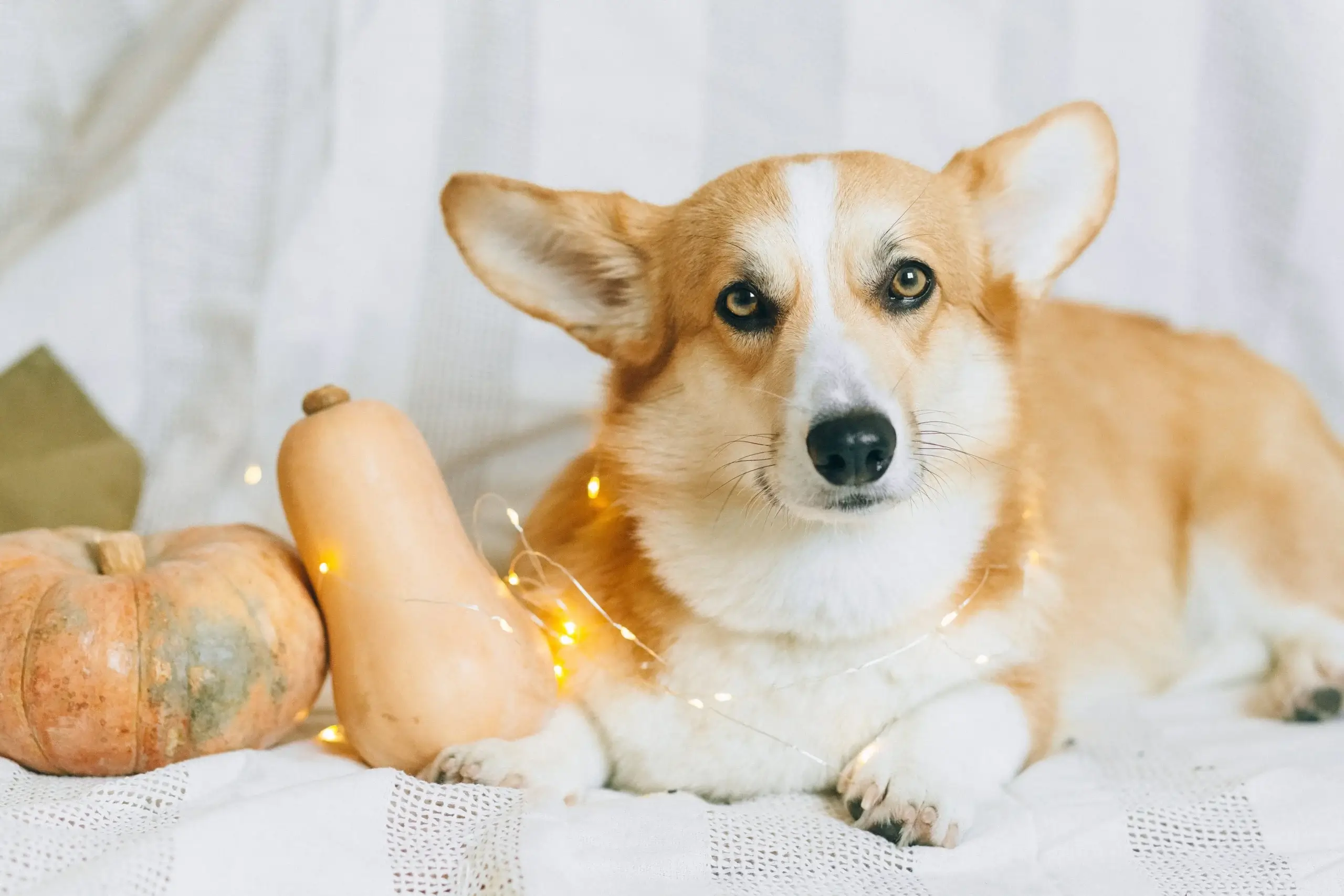
DogFoodAdvisor is reader supported See how
Dog Food Advisor is 100% impartial and is never paid to promote any brand. But if you buy using links on this page, we may earn a referral fee.
Thanksgiving is that special time of year when families and friends gather to enjoy delicious food and express gratitude for each other.
But what are we more thankful for than our beloved four-legged friends?
While indulging in traditional dishes is a central part of the celebration, many pet parents wonder if it’s safe to share a turkey dinner with their dogs.
Of course, there are certain components of the Thanksgiving meal that can be shared with your furry companion safely, but there are specific ingredients to watch out for.
In this article, we’ll explore some Thanksgiving treats that are safe and those that are best left off your dog’s plate.
Safe Thanksgiving Food For Dogs
Can Dogs Eat Thanksgiving Turkey?
Turkey, the star of the Thanksgiving show, can be a healthy meat and a great source of protein for your dog. However, the way the turkey is cooked makes a difference. Roasting a turkey makes it a rich and fatty food that has the potential to cause digestive upset for dogs, so be mindful of how the turkey is cooked and offer it in moderation.
It’s also crucial to ensure the turkey is unseasoned as seasoning can be dangerous for your furry friend. Never feed your dog cooked bones, as they can splinter in their mouth or get stuck and puncture the digestive tract — no one wants to pay a visit to the vet at Thanksgiving!
Can My Dog Eat Sweet Potatoes?
When cooked and served in moderation, plain sweet potatoes are another dog-friendly option at Thanksgiving. They’re packed with vitamins and fiber, making them a healthy treat. Avoid adding butter, sugar, or marshmallows, as these can be harmful to your pet.
Can My Dog Eat Pumpkin?
Plain pumpkin, whether canned or cooked, is an excellent source of fiber and nutrients for dogs. It can even help with digestive issues. Just make sure it’s free from any added sugars or spices.
Can My Dog Eat Cranberries?
Cranberries are a quintessential part of Thanksgiving, whether you love or hate them – and the same might go for your dog. Cranberries can be fed raw, cooked, and dried to your dog, but only in moderation. It’s best to avoid cranberry sauce, which often contains high levels of sugar.
Can My Dog Eat Corn?
It is perfectly safe for your dog to eat corn off the cob. Corn can be a good source of protein, carbohydrates, fat, and fiber — just ensure it is free of butter and salt. It might be tempting to allow your dog to gnaw on the cob under the table, but corn on the cob is a strict no for dogs. Dogs cannot digest the cob and often this causes a blockage in the digestive tract.
Can My Dog Eat Bread Rolls?
Bread isn’t necessarily harmful for dogs but like humans, only in moderation. It’s worth noting that bread is relatively high in calories and doesn’t offer many nutritional benefits for your dog.
Can My Dog Eat Cheese?
Planning to serve a cheese board? You can offer a nibble to your dog too. Keep in mind some cheeses contain herbs or other products that are toxic to dogs, such as garlic, onions, and chives. Cheese is also high in fat, unfortunately, so moderation is best, especially if your dog has pancreatitis.
Can My Dog Eat Apples?
Thanksgiving just wouldn’t be the same without apples gracing our tables. Whether in a homemade apple pie, as part of a salad, or featured in stuffing, they’re a staple of the holiday. While they’re not safe for dogs in those recipes, a little cut-up apple on its own is an excellent source of fiber. Avoid giving them the stem, core, and seeds as they can be a choking hazard and the seeds contain cyanide which is toxic for dogs.
Can My Dog Eat Rice?
If you’re serving a rice-based dish at Thanksgiving, plain cooked rice can be a bland and gentle treat for dogs, especially if they have an upset stomach.
Can My Dog Eat Greens?
Peas, green beans, and broccoli are dog-friendly foods and are excellent sources of nutrients. They might even enjoy a Brussels sprout!
What Not To Feed Your Dog On Thanksgiving
Can My Dog Eat Stuffing?
Do not give your dog the turkey skin, gravy, or stuffing. These foods often have additional spices, butter, and other ingredients that are too rich for dogs. Stuffing usually contains onion and garlic, which are toxic for dogs.
Can My Dog Eat Desserts?
While pumpkin pie is not toxic, it contains too much sugar for a dog. Chocolate can be toxic for dogs and is best to avoid in any form. Some desserts and candy may contain xylitol so if you want your dog to enjoy an after-dinner delight, it’s best to give them a dog treat to be on the safe side.
Can My Dog Eat Mashed Potatoes?
Cooked potatoes are generally safe for dogs in small quantities, but many potato dishes contain added salt and fat, which should be avoided by your furry friend.
Is It Safe To Give My Dog Alcohol?
Dogs cannot metabolize alcohol, so beverages, foods, or household products containing different forms of alcohol are unhealthy and can be toxic.
In general, dogs can eat a few nibbles of turkey, sweet potato, pumpkin, and a few other plain, unseasoned veggies at Thanksgiving. Avoid giving your dog any bones, alcohol, fatty foods, or food that contains toxic ingredients such as onion, garlic, chocolate, or xylitol.
So, when your dog turns on those puppy dog eyes when you present the turkey, you know exactly what they can enjoy. Although it might be best to buy in a few extra dog treats or turkey-based dog food if you really want to get them into the festive spirit.
And remember, everything in moderation! (That goes for humans as well as dogs.)

Final word
The Dog Food Advisor does not accept money, gifts, samples or other incentives in exchange for special consideration in preparing our reviews.
However, we do receive a referral fee from online retailers (like Chewy or Amazon) and from sellers of perishable pet food when readers click over to their websites from ours. This helps cover the cost of operation of our free blog. Thanks for your support.
For more information, please visit our Disclaimer and Disclosure page.
Article reviewed by
Laura Ward
Pet Nutritionist
Laura studied BSc (Hons) Animal Science with an accreditation in Nutrition at the University of Nottingham, before working for eight years in the pet food and nutrition industry.




